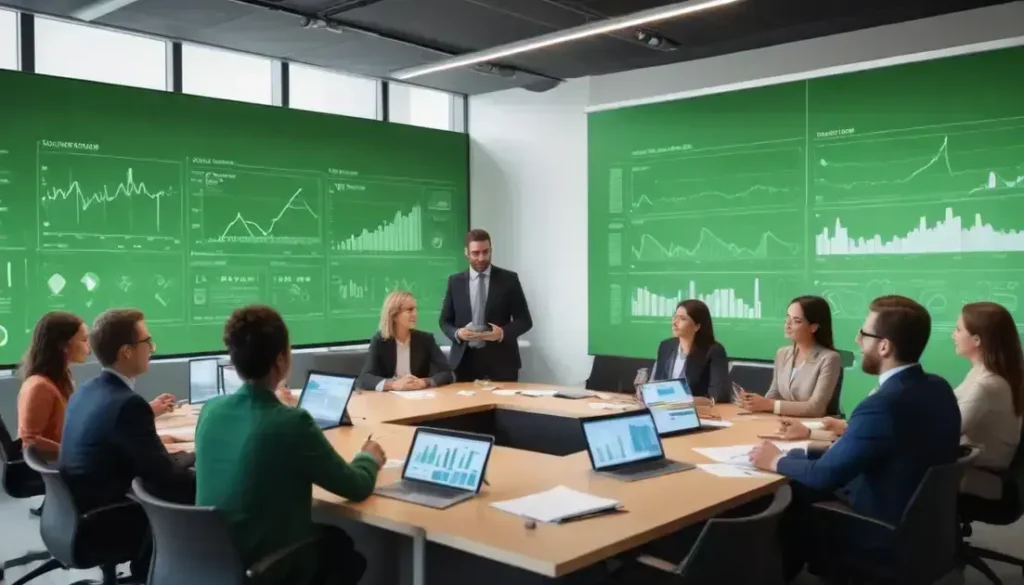Sustainability in procurement involves integrating eco-friendly practices into supply chain operations, focusing on measurable goals, transparency, and collaboration to reduce environmental impact while enhancing business efficiency and reputation.
In the realm of procurement, Sustainability has emerged as a key focus. This article delves into insights from Kathy Presto, shedding light on how sustainability initiatives are reshaping procurement practices.
Introduction to Sustainability LIVE Chicago
At Sustainability LIVE Chicago, the intersection of sustainability and procurement takes center stage. This event serves as a platform for industry leaders to share insights on how businesses can incorporate sustainable practices into their operations. Participants engage in discussions that highlight the necessity of environmental awareness and accountability in supply chains.
The significance of sustainability in procurement cannot be overstated. With rising consumer expectations for corporate responsibility, companies are challenged to adapt their strategies. Emphasizing ethical sourcing and reducing carbon footprints are now essential for maintaining competitiveness. Firms are increasingly expected to demonstrate their commitment to sustainability through transparent reporting and measurable outcomes.
Panels featuring experts, like Kathy Presto, provide invaluable knowledge on emerging trends that influence procurement decisions. Such discussions encourage businesses to evaluate their current practices and innovate towards a sustainable future. The event sheds light on collaboration opportunities among various stakeholders, fostering a community dedicated to achieving sustainability goals.
In addition to addressing challenges, the forum inspires actionable solutions that firms can implement immediately. Understanding the evolving landscape of regulations and market demand empowers procurement professionals to navigate complexities with confidence, paving the way for a more sustainable approach.
Kathy Presto’s Role at HH Global
Kathy Presto, a prominent figure at HH Global, plays a vital role in championing sustainable practices within the procurement sector. Her extensive experience enables her to bridge the gap between traditional procurement strategies and modern sustainability goals. As a thought leader, she advocates for the integration of green initiatives in supply chains, emphasizing the need for companies to align their operations with eco-friendly principles.
At the core of Kathy’s mission is the drive to educate and empower businesses about the importance of sustainability. She conducts workshops and seminars that showcase effective methodologies for implementing sustainable practices. By providing actionable insights, she not only raises awareness but also inspires change across procurement teams.
Her collaboration with various stakeholders is instrumental in fostering a dialogue about best practices in sustainability. Kathy often highlights case studies that illustrate the tangible benefits of adopting sustainable procurement strategies. These discussions are crucial for businesses seeking to enhance their corporate responsibility and meet the growing demands of environmentally conscious consumers.
Additionally, Kathy Presto remains at the forefront of industry trends and regulatory changes that impact supply chain management. Her proactive approach ensures that HH Global remains a leader in promoting sustainability, encouraging firms to innovate while prioritizing environmental stewardship.
Key Insights from the Women in Procurement Panel
The Women in Procurement Panel at Sustainability LIVE Chicago provided valuable insights into the evolving landscape of procurement and sustainability. A diverse group of experts discussed the critical role that women play in driving sustainable practices within organizations. Their contributions highlight the importance of inclusivity and diverse perspectives in achieving sustainability goals.
Panelists emphasized how a woman’s viewpoint often brings unique problem-solving abilities, particularly in nurturing relationships with suppliers and stakeholders. The discussions tackled the challenges women face in procurement and suggested strategies to overcome these obstacles, such as mentorship programs and networking opportunities.
Another key insight was the integration of technology in procurement processes. Participants shared how digital tools can enhance collaboration and transparency, ultimately leading to better sustainability outcomes. They noted that staying updated with technological advancements is crucial for modern procurement teams.
Moreover, the panelists discussed the significance of setting measurable sustainability targets. Real-life examples illustrated the impact that clear objectives have on driving accountability and performance within organizations. By focusing on tangible goals, companies can track progress and motivate teams toward achieving their sustainability commitments.
Connecting Sustainability and Procurement
Connecting sustainability and procurement is becoming increasingly vital as businesses strive to meet environmental goals. Procurement professionals are now tasked with finding solutions that not only fulfill organizational needs but also contribute to a healthier planet. By prioritizing sustainable sourcing, companies can reduce their carbon footprints and promote ethical practices.
A key aspect of this connection is the emphasis on collaboration among suppliers and manufacturers. Working closely with partners allows organizations to ensure that their supply chains adhere to sustainability standards. This not only builds trust but also enhances the reputation of the businesses involved.
Moreover, implementing circular economy principles can transform procurement strategies. By focusing on recycling, reusing materials, and minimizing waste, firms can create value while fostering sustainable development. This shift toward more responsible practices is essential for long-term success.
Innovation in sustainability metrics is also crucial in bridging the gap between procurement and environmental goals. By integrating these metrics into procurement processes, companies can effectively monitor their progress. This data-driven approach enables businesses to make informed decisions that align with their sustainability objectives.
The Impact of Legislation on Supply Chains
The impact of legislation on supply chains is profound, especially as governments implement stricter regulations regarding sustainability and ethical practices. Companies must now navigate a complex framework of laws that govern environmental standards, labor conditions, and corporate accountability. These regulations compel organizations to rethink their supply chain strategies to ensure compliance.
Recent changes in legislation require firms to disclose their sustainability practices and the environmental impact of their operations. This transparency is vital for building trust with consumers and stakeholders. Companies failing to adhere to these laws may face significant penalties, disrupting their operations and damaging their reputation.
Furthermore, legislation often incentivizes businesses to invest in sustainable practices. By complying with environmental regulations, companies can benefit from tax breaks or grants aimed at promoting green initiatives. This creates an opportunity for firms to enhance their sustainability while reducing operational costs.
In addition, multinational companies must consider varying laws across different regions. Understanding local regulations is essential for maintaining a robust global supply chain. Businesses that can adapt quickly to these changes will not only remain compliant but will also gain a competitive advantage in the market.
The Urgency of Sustainability in Business
The urgency of sustainability in business is more pronounced than ever, as companies face growing pressure from consumers, stakeholders, and governments to adopt environmentally friendly practices. With climate change posing a significant threat, businesses must act swiftly to reduce their carbon footprint and shift towards sustainable operations.
Organizations are recognizing that sustainability is not just a regulatory requirement but a critical business strategy. Embracing sustainable practices can lead to cost savings, improved efficiency, and enhanced brand reputation. For instance, utilizing renewable energy sources can lower energy costs while also appealing to environmentally conscious consumers.
Moreover, the move towards sustainability is becoming a competitive differentiator. Companies that prioritize sustainability attract a loyal customer base willing to support brands that align with their values. This shift is evident as consumers increasingly demand transparency regarding environmental practices and are more likely to choose brands committed to sustainability.
Additionally, investors are increasingly factoring in sustainability when making investment decisions. Organizations demonstrating commitment to sustainable practices are more appealing to investors looking for long-term stability and ethical responsibility. As a result, integrating sustainability into core business strategies is not merely beneficial but essential for future success.
Exploring Collaboration Opportunities
Exploring collaboration opportunities in the realm of sustainability is essential for businesses aiming to enhance their environmental impact. By forming strategic partnerships, organizations can leverage resources, knowledge, and technologies that foster innovation. Collaboration can occur at various levels, including between businesses, governments, NGOs, and researchers.
One significant area for collaboration is in the sharing of best practices. Organizations can learn from each other’s successes and challenges, allowing them to implement more effective sustainability measures more quickly. By participating in industry forums and networks, companies can also contribute to the development of standardized sustainability practices that benefit the entire sector.
Furthermore, joint initiatives on projects such as renewable energy or waste management can result in shared costs and enhanced outcomes. Collaborative efforts can also create awareness and drive consumer engagement, as stakeholders come together to address environmental issues collectively. Initiatives like community outreach programs can reinforce a company’s commitment to sustainability while building a positive brand image.
Investing in collaborative research is another opportunity to explore. By teaming up with academic institutions or research bodies, businesses can develop innovative solutions tailored to their sustainability goals. These collaborations not only enhance knowledge sharing but can also lead to groundbreaking innovations that revolutionize traditional practices.
Challenges Faced in Sustainable Procurement
Sustainable procurement presents a range of challenges that organizations must navigate to implement effective strategies. One of the primary issues is the lack of standardization in sustainability criteria. Different industries and sectors often have varying interpretations of what constitutes sustainable practices, leading to confusion and inconsistency in procurement decisions.
Another significant challenge is the cost implications associated with sustainable materials and suppliers. Many businesses find that eco-friendly options come at a premium price, which can discourage them from making the switch. This financial burden can be especially challenging for smaller firms with limited budgets, who may struggle to justify the initial investment.
Moreover, there is often a knowledge gap regarding sustainability among procurement professionals. Many lack the necessary training or resources to evaluate suppliers effectively on their sustainable practices. This can result in missed opportunities for improvement and partnerships with suppliers committed to sustainability.
Additionally, businesses may face resistance to change from internal stakeholders who are accustomed to traditional procurement methods. Overcoming this cultural resistance is crucial for evolving procurement practices toward sustainability. Companies must engage and educate their teams on the long-term benefits of sustainable procurement to foster a shift in mindset.
Future Trends in Sustainability and Procurement
The future of sustainability and procurement is poised for significant evolution as businesses increasingly recognize the importance of environmentally responsible practices. One major trend is the adoption of advanced technologies like artificial intelligence and blockchain. These innovations will enable procurement professionals to make informed, data-driven decisions that enhance sustainability throughout the supply chain.
Moreover, there is a growing emphasis on circular economy principles. Companies are shifting from traditional linear models to circular strategies that prioritize resource efficiency and waste reduction. This transition encourages businesses to design products with their end-of-life in mind, thereby promoting recycling and reusability.
Collaboration with suppliers is also likely to deepen, as firms seek to build partnerships that align with their sustainability goals. By working closely with suppliers, businesses can ensure compliance with sustainability standards and foster innovation. This collaborative approach can lead to the development of new solutions that benefit both parties.
Additionally, consumer demand for transparency is increasing. Shoppers are becoming more discerning, seeking brands that openly communicate their sustainability efforts and impact. Businesses that prioritize transparency will not only enhance their reputations but also foster customer loyalty in an increasingly competitive market.
Concluding Thoughts on Sustainability Goals
Concluding thoughts on sustainability goals emphasize the importance of commitment and proactive strategies. As organizations strive to meet their environmental targets, a clear roadmap is essential. Companies must define specific, measurable, achievable, relevant, and time-bound (SMART) objectives to track progress effectively. Setting these goals provides clarity and motivates stakeholders to align their efforts towards a common vision.
Regular assessment and transparency in reporting are crucial for maintaining accountability. Businesses should share their sustainability metrics with stakeholders, creating trust and encouraging collaboration. This practice not only enhances credibility but also fosters a culture of continuous improvement within the organization.
Moreover, engaging employees in sustainability initiatives is vital. By involving staff in the decision-making process and implementation of sustainable practices, companies can cultivate a shared sense of responsibility. Training programs and workshops can equip employees with the necessary skills to contribute effectively to sustainability efforts.
Lastly, collaboration with external partners is imperative. Building alliances with suppliers, customers, and community organizations can amplify the impact of sustainability goals. Through these partnerships, businesses can share best practices, access new resources, and innovate solutions that benefit both the environment and society at large.
In Summary: The Path to Sustainable Success
Achieving sustainability goals is a journey that requires dedication and strategic planning. Companies must clearly define their objectives and ensure everyone within the organization understands their role in this mission. By setting SMART goals, businesses can track progress and motivate their teams to contribute.
Transparency in reporting is essential. When organizations share their sustainability metrics, they build trust with stakeholders and demonstrate accountability. Engaging employees in these initiatives helps create a culture of sustainability, making everyone feel responsible for the company’s environmental impact.
Additionally, partnerships and collaborations enhance the effectiveness of sustainability efforts. By working with suppliers and community members, companies can amplify their impact and share valuable resources. Together, these efforts can lead to innovative solutions that benefit both the environment and society.
Ultimately, committing to sustainability is not just good for the planet; it is also a smart business strategy that can lead to long-term success and a positive reputation. Taking these steps ensures that organizations are not only ready for the future but also play a vital role in creating a more sustainable world.
Frequently Asked Questions
What are the main benefits of setting sustainability goals for my business?
Setting sustainability goals helps streamline operations, improve brand reputation, and meet consumer demand for eco-friendly practices, ultimately leading to long-term success.
How can I measure my company’s progress towards sustainability goals?
You can measure progress by establishing specific metrics, regularly reporting on sustainability efforts, and conducting audits to evaluate performance against set targets.
What role do employees play in achieving sustainability in our company?
Employees are crucial in driving sustainability initiatives. Engaging them in training and decision-making fosters a culture of accountability and innovation towards sustainable practices.
How important is transparency in sustainability reporting?
Transparency builds trust with stakeholders. By openly sharing sustainability metrics and progress, companies enhance credibility and encourage collaboration.
What are some effective strategies for collaborating on sustainability projects?
Effective strategies include forming partnerships with local communities, NGOs, and suppliers, sharing best practices, and working together on joint sustainability initiatives.
Can small businesses also implement sustainability initiatives?
Yes, small businesses can implement sustainability initiatives by setting realistic goals, utilizing available resources, and gradually integrating eco-friendly practices into their operations.


